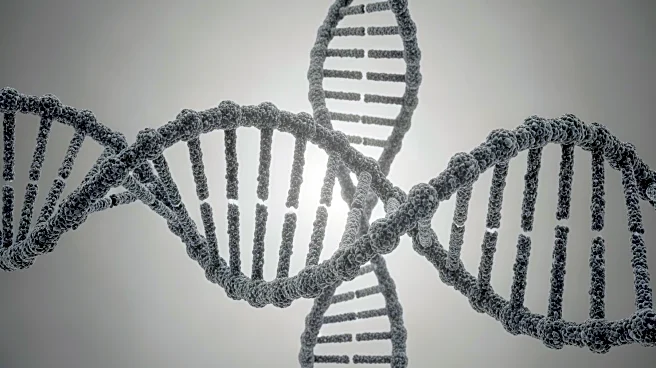What's Happening?
Recent advancements in DNA-based data storage have been marked by the development of the DNA StairLoop coding scheme. This innovative error correction technology is designed to address high error rates
associated with DNA synthesis techniques, such as photochemical and electrochemical synthesis. The DNA StairLoop employs a staircase interleaver design, which enhances parallelism in the decoding process and improves error correction capabilities. The coding structure involves serial-concatenated codes with independent row and column codes, allowing for iterative decoding that follows the turbo principle. This method is particularly effective in correcting insertion and deletion errors, which are common in DNA data storage. The technology has been validated through in-vitro experiments, demonstrating its robustness in recovering data under high error conditions.
Why It's Important?
The DNA StairLoop technology represents a significant advancement in the field of DNA data storage, offering a solution to the challenges posed by high error rates in synthesis methods. Its ability to correct errors iteratively and in parallel enhances the reliability and efficiency of DNA data storage systems. This development is crucial for industries relying on large-scale data storage solutions, as it promises improved data integrity and faster decoding processes. The technology's adaptability to various DNA synthesis techniques also broadens its applicability, potentially benefiting sectors such as biotechnology, data archiving, and information technology.
What's Next?
The DNA StairLoop technology is expected to undergo further testing and refinement to optimize its performance across different synthesis methods. As the technology matures, it may see increased adoption in commercial DNA data storage systems, driving innovation in data storage solutions. Researchers and industry stakeholders are likely to explore additional applications and improvements, potentially integrating the technology into existing data storage infrastructures. The continued development of DNA StairLoop could lead to new standards in error correction for DNA-based data storage, influencing future research and development in the field.
Beyond the Headlines
The introduction of DNA StairLoop technology may have broader implications for the ethical and legal aspects of data storage. As DNA data storage becomes more reliable, questions about data privacy, ownership, and security may arise, necessitating new regulatory frameworks. Additionally, the technology's potential to store vast amounts of data in a compact form could lead to shifts in how data is archived and accessed, impacting cultural and societal norms around information sharing and preservation.










